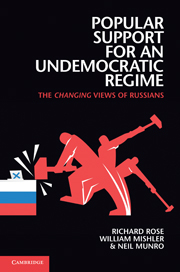Book contents
- Frontmatter
- Contents
- List of figures
- List of tables
- Introduction: The need for popular support
- 1 Democratic and undemocratic models of support
- 2 Changing the supply of regimes
- 3 Putin consolidates a new regime
- 4 Increasing support for an undemocratic regime
- 5 Individual influences on regime support
- 6 Time tells: there is no alternative
- 7 Finessing the challenge of succession
- 8 The challenge of economic reversal
- 9 Maintaining a regime – democratic or otherwise
- Appendix A New Russia Barometer samples
- Appendix B Coding of variables
- References
- Index
7 - Finessing the challenge of succession
Published online by Cambridge University Press: 05 June 2012
- Frontmatter
- Contents
- List of figures
- List of tables
- Introduction: The need for popular support
- 1 Democratic and undemocratic models of support
- 2 Changing the supply of regimes
- 3 Putin consolidates a new regime
- 4 Increasing support for an undemocratic regime
- 5 Individual influences on regime support
- 6 Time tells: there is no alternative
- 7 Finessing the challenge of succession
- 8 The challenge of economic reversal
- 9 Maintaining a regime – democratic or otherwise
- Appendix A New Russia Barometer samples
- Appendix B Coding of variables
- References
- Index
Summary
In a new regime, the fluidity of institutions makes political succession a challenge. In a consolidated regime, “When things go wrong, you change the rulers, not the regime,” but in a new regime the opposite can happen (Huntington, 1991: 266–267). Whether the decision about who governs is taken by the electorate or by an unaccountable elite, if leaders are twice changed within the rules then Huntington considers this evidence of a regime's support being consolidated. Two turnovers show that both the founders and their initial opponents are now committed to an orderly succession in office rather than wanting to reopen past conflicts. It also allows for the passage of time to encourage popular support or, at least, resigned acceptance, if not positive support. Control of government did not initially change hands between parties until twenty years after the founding of the Federal Republic of Germany and twenty-three years after the founding of the French Fifth Republic.
Huntington's two-turnover test is equally applicable to authoritarian regimes. Throughout its history the Soviet Union successfully met the challenge of leadership succession. Normally, the tenure of the leader was for life. The first turnover occurred after Lenin's death and the second did not occur until Josef Stalin died after thirty-one years in which he had institutionalized a strong party-state. In the next three decades there were six changes in the leading position in the regime, the general secretaryship of the Communist Party.
- Type
- Chapter
- Information
- Popular Support for an Undemocratic RegimeThe Changing Views of Russians, pp. 124 - 141Publisher: Cambridge University PressPrint publication year: 2011



